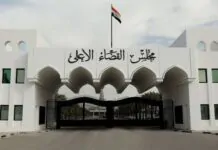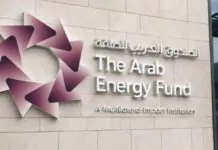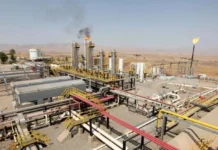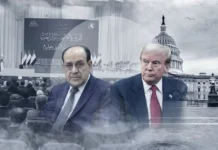Carrying Messages From The White House, A US Delegation Will Visit Baghdad Soon
Political | 19/11/2025 Mawazin News – Baghdad: An Iraqi diplomatic source revealed an upcoming visit by a US delegation to Baghdad to deliver messages from the White House regarding Iraqi issues.
The source stated that “a delegation comprising American political figures will visit Baghdad soon, carrying messages from Washington to all partners in the Iraqi political process.” He added that “the anticipated US visit confirms Washington’s interest in what is happening in Iraq.”
Relations between the United States and Iraq have been strained diplomatically since Donald Trump took office, with communication and meetings limited to the US Chargé d’Affaires in Baghdad, Steven Fagin, and a single phone call received by Prime Minister Mohammed Shia al-Sudani from Secretary of State Marco Rubio.
However, last August, a high-level US delegation visited Baghdad to discuss a range of issues with Iraqi officials.
According to a well-informed source, the delegation discussed the US withdrawal from its main bases in Iraq and its repercussions, in addition to economic and energy matters.
On October 19, US President Donald Trump appointed Mark Savaya as Special Envoy to Iraq.
Trump wrote on his Truth Social platform that “Mark’s deep understanding of the relationship between Iraq and the United States, and his extensive connections in the region, will contribute to advancing the interests of the American people.”
Savaya, an American businessman of Iraqi (Chaldean/Assyrian) descent from Michigan, has risen to prominence in recent years through his support for Trump’s presidential campaign and his outreach to Middle Eastern communities in the United States. https://www.mawazin.net/Details.aspx?jimare=270511
The Iraq Stock Exchange Traded More Than 10 Billion Dinars Last Week
Economy | 18/11/2025 Mawazin News – Baghdad: The Iraq Stock Exchange announced that trading volume last week exceeded 10 billion dinars, with significant activity encompassing the majority of listed companies.
In its weekly report, the exchange explained that “63 listed companies saw their shares traded during the week, while 28 companies’ shares did not trade due to discrepancies between buy and sell orders. Trading remained suspended for 13 companies out of a total of 104 listed companies due to their failure to submit the required disclosures.
” The report added that “the number of shares traded reached 22.234 billion, representing a 700% increase compared to the previous week, with a total value of 10.622 billion dinars, a 63% increase, across 3,358 transactions.”
It also noted that “the ISX60 index closed at 960.15 points, marking a 1.65% increase from the previous close.”
He confirmed that “the transactions of non-Iraqi investors witnessed the purchase of 31 million shares worth 66 million dinars through 13 deals, compared to the sale of 101 million shares worth 207 million dinars through the execution of 109 deals.” https://www.mawazin.net/Details.aspx?jimare=270459
Rapidly Widening Deficit And Dwindling Reserves… Warnings Paint The Most Dire Picture Of The Iraqi Economy In Years
Economy | 19/11/2025 Mawazin News – Special Report : Economic expert Manar al-Ubaidi warned that the Iraqi economy is entering its most critical phase in years, amidst escalating political turmoil and the clamor of electoral alliances. He pointed out that current financial indicators reveal a worrying reality that requires urgent intervention and bold decisions.
Al-Ubaidi told Mawazin News, “According to the Ministry of Finance’s data for August 2025, total revenues reached 82 trillion dinars, including 73 trillion dinars from oil sales, compared to only 9 trillion dinars from non-oil revenues. This reinforces the continued reliance of the budget on oil revenues by more than 90%.”
In contrast, public spending reached 87.5 trillion dinars, including 73 trillion dinars in operational expenses, in addition to 5 trillion dinars paid as government advances, which are usually included in actual expenditures at the end of each year. This raises the real deficit to approximately 10 trillion dinars by the end of August.
According to Al-Ubaidi, estimates indicate that the deficit could exceed 15 trillion dinars by the end of the current year if spending continues at the same pace.
Regarding monetary policy, data from the Central Bank of Iraq reveals that the bank purchased only about $49 billion from the Ministry of Finance during the first nine months of the year, while selling more than $60 billion through the currency window. This forced the bank to use about $11 billion of its reserves to meet the increasing demand for dollars, a dangerous indicator reflecting deep imbalances in the market.
This financial drain coincides with oil prices remaining within the range of $60-65 per barrel, a level insufficient to cover inflated operational expenses. This means, according to Al-Ubaidi, that the current government, as well as the next one, may face real difficulty in fulfilling salary and subsidy obligations unless urgent measures are taken to increase [the budget/funds/etc.]. Revenues and spending rationalization.
The expert also points out that “the option of resorting to borrowing will not be readily available, especially after the internal debt exceeded 90 trillion dinars, and the local market’s ability to absorb more debt instruments has declined, making the options available to the government narrower than ever before.”
Al-Ubaidi believes that “real reform begins with a thorough review of public spending schedules down to the smallest expenditure items, focusing on the issues of financial waste, ghost salaries, pensions, and social welfare, which drain billions annually, with a significant portion going to those not entitled to them or being exploited for electoral purposes.”
He also emphasizes the need to reassess the food ration card system, drug subsidies, and other support programs to ensure their efficiency and achievement of their objectives.
The economist summarizes that “Iraq stands today at a critical financial crossroads, coinciding with the possibility of a delay in approving next year’s budget due to the formation of the new government, which could push the country towards an ‘ambiguous’ fiscal year without a clear spending ceiling,” stressing that “the crisis is no longer just figures in official data, but a real danger threatening the state’s ability to continue paying its salaries and obligations,” warning that delaying reform will lead to Coercive measures that affect the poor citizen even more than the employee.” https://www.mawazin.net/Details.aspx?jimare=270485
Economist: Concerns About A Possible Change In The Exchange Rate With The Formation Of The New Government
Economy | 19/11/2025 Mawazin News – Baghdad: Economic researcher Diaa Abdul Karim believes there is anticipation and apprehension among the Iraqi public regarding a potential decision by the incoming government to change the exchange rate of the dollar against the dinar.
Abdul Karim stated, “Previous governments have altered the exchange rate, and this has negatively impacted the Iraqi people, particularly individuals and their cost of living.”
He added, “Changing the exchange rate to devalue the dinar means a general rise in prices, which is a source of concern for Iraqi citizens who have become accustomed to such decisions with the formation of new governments.”
He emphasized the urgent need for assurances from those leading the political process, or the largest bloc, clarifying the nature of the government’s program for the upcoming phase: whether it includes a change in the dinar’s value against the dollar or maintaining the current status quo. https://www.mawazin.net/Details.aspx?jimare=270471
Gold Prices Are Rising… How Much?
Economy | 19/11/2025 Mawazin News – Follow-up: Gold prices rose on Wednesday as investors awaited the minutes from the Federal Reserve’s latest monetary policy meeting and the US jobs report, which could shed further light on the path of interest rates.
Spot gold rose 0.2% to $4,074 per ounce at 04:49 GMT, while US gold futures for December delivery also climbed by the same percentage to $4,074.40 per ounce.
Tim Waterer, senior market analyst at KCM Trade, said, “Gold’s momentum has been somewhat dampened by the stronger dollar and uncertainty surrounding the timing of the Fed’s next interest rate cut.”
He added, “However, a wave of risk aversion in the market has kept gold in the investor’s safe-haven interest rate circle, limiting the decline.”
The dollar index rose 0.1% against a basket of major currencies. A stronger dollar makes gold more expensive for holders of other currencies.
Global stock markets fell sharply this week, with the S&P 500 posting a four-day losing streak amid concerns about the valuations of artificial intelligence stocks.
Investors are now awaiting the minutes from the Federal Reserve’s latest meeting, due later today, and the September non-farm payrolls report, due tomorrow, Thursday, after being delayed due to the U.S. government shutdown.
Economists polled by Reuters expect the report to show employers added 50,000 jobs during the month.
Data released Tuesday showed that the number of Americans receiving unemployment benefits hit a two-month high in mid-October.
The U.S. central bank has cut interest rates by 25 basis points, but Chairman Jerome Powell has expressed caution about any further rate cuts this year, citing several reasons, including a lack of data.
As for other precious metals, silver rose 0.4% to $50.90 an ounce in spot trading, platinum fell 0.2% to $1,533.82, and palladium gained 0.6% to $1,409.19. https://www.mawazin.net/Details.aspx?jimare=270475
For current and reliable Iraqi news please visit: https://www.bondladyscorner.com






